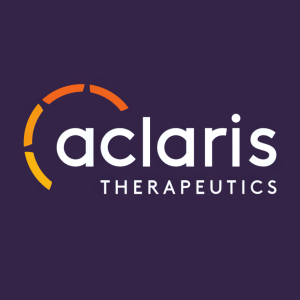Aclaris Therapeutics Announces Top-line Results from 4-Week Phase 2b Trial of ATI-1777 for Mild to Severe Atopic Dermatitis
- ATI-1777
- Minimal Systemic Exposure Supports “Soft” Topical JAK Inhibitor Approach -
- ATI-1777 Was Well Tolerated -
WAYNE, Pa., Jan. 10, 2024 (GLOBE NEWSWIRE) -- Aclaris Therapeutics, Inc. (NASDAQ: ACRS), a clinical-stage biopharmaceutical company focused on developing novel drug candidates for immuno-inflammatory diseases, today announced top-line results from its Phase 2b study of ATI-1777, an investigational topical “soft” JAK 1/3 inhibitor, in patients with mild to severe atopic dermatitis (AD) (ATI-1777-AD-202; NCT05432596). ATI-1777 was generated from Aclaris’ proprietary KINect® drug discovery platform.
ATI-1777-AD-202 was a Phase 2b, multicenter, randomized, double-blind, vehicle-controlled, parallel-group clinical trial to evaluate the efficacy, safety, tolerability and pharmacokinetics (PK) of multiple concentrations (
“The trial demonstrated efficacy results, a pharmacokinetic profile and safety results that were consistent with what was seen in the Phase 2a trial of ATI-1777,” stated Dr. Neal Walker, Aclaris’ Chairman of the Board of Directors. “We are excited that ATI-1777 demonstrated response rates on par with existing market competition, along with a differentiated safety profile relative to JAK inhibitors given the low systemic absorption seen in both Phase 2 studies. These results are particularly encouraging given the higher than anticipated vehicle response and the mid-study inclusion of a milder patient population. The convenience of a spray formulation along with the potential to move to once-a-day dosing, potentially offer additional distinct advantages to patients suffering from atopic dermatitis.”
Results
The trial met the primary efficacy endpoint, the percent change from baseline in the Eczema Area and Severity Index (EASI) score at week 4, with statistical significance for patients treated with ATI-1777
- While not statistically superior, ATI-1777
2% QD showed a trend toward significance (68.3% compared to59.5% in vehicle, p=0.086). - In the per-protocol population, or all patients who had week 4 data with no major protocol deviations, ATI-1777
2% BID demonstrated a70.8% reduction in EASI compared to a58.5% reduction in vehicle (p=0.025), and ATI-17772% QD demonstrated a68.4% reduction in EASI compared to a59.7% reduction in vehicle (p=0.102). - In addition, a post-hoc analysis of only patients who had baseline severity of moderate or severe AD showed a
65.6% and65.1% reduction in the EASI score at week 4 in ATI-17772% BID and ATI-17772% QD, respectively, compared to a52.6% reduction in the pooled vehicle group (p=0.029 and 0.040, respectively).
While not statistically powered, ATI-1777
A PK analysis showed minimal levels of exposure to ATI-1777. The mean steady state trough drug levels at week 4 were 0.319 ng/mL, representing
No meaningful safety findings were observed and ATI-1777 was well tolerated. In particular, no adverse events (AEs) commonly associated with JAK inhibitors, including serious infections, malignancies, major adverse cardiovascular events (MACE) and thromboses, were observed in patients treated with ATI-1777. The most common AEs in patients treated with ATI-1777 (reported in ≥
“We thank the investigators and patients for their participation in the trial, and our employees for their dedication to its execution,” stated Douglas Manion, M.D., Aclaris’ Chief Executive Officer. “As previously announced, we intend to seek a development and commercialization partner for this program, which could include additional indications such as vitiligo.”
Aclaris plans to submit the full results to an upcoming scientific conference.
About Aclaris Therapeutics, Inc.
Aclaris Therapeutics, Inc. is a clinical-stage biopharmaceutical company developing a pipeline of novel drug candidates to address the needs of patients with immuno-inflammatory diseases who lack satisfactory treatment options. The company has a multi-stage portfolio of drug candidates powered by a robust R&D engine exploring protein kinase regulation. For additional information, please visit www.aclaristx.com.
Cautionary Note Regarding Forward-Looking Statements
Any statements contained in this press release that do not describe historical facts may constitute forward-looking statements as that term is defined in the Private Securities Litigation Reform Act of 1995. These statements may be identified by words such as “believe,” “anticipate,” “expect,” “intend,” “may,” “plan,” “potential,” “will,” and similar expressions, and are based on Aclaris’ current beliefs and expectations. These forward-looking statements include Aclaris’ expectations regarding the development strategy for ATI-1777, including intentions to seek a development and commercialization partner for the asset, and its plans to submit the data to an upcoming scientific conference. These statements involve risks and uncertainties that could cause actual results to differ materially from those reflected in such statements. Risks and uncertainties that may cause actual results to differ materially include uncertainties inherent in the conduct of clinical trials, Aclaris’ reliance on third parties over which it may not always have full control, Aclaris’ ability to enter into strategic partnerships on commercially reasonable terms, the uncertainty regarding the macroeconomic environment and other risks and uncertainties that are described in the Risk Factors section of Aclaris’ Annual Report on Form 10-K for the year ended December 31, 2022 and other filings Aclaris makes with the U.S. Securities and Exchange Commission from time to time. These documents are available under the “SEC Filings” page of the “Investors” section of Aclaris’ website at www.aclaristx.com. Any forward-looking statements speak only as of the date of this press release and are based on information available to Aclaris as of the date of this release, and Aclaris assumes no obligation to, and does not intend to, update any forward-looking statements, whether as a result of new information, future events or otherwise.
Aclaris Therapeutics Contact:
investors@aclaristx.com








